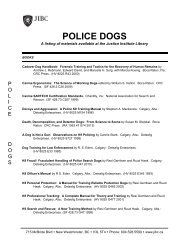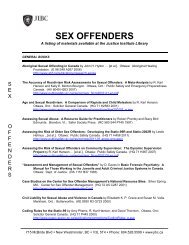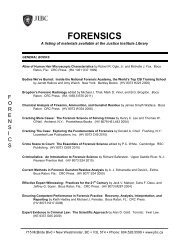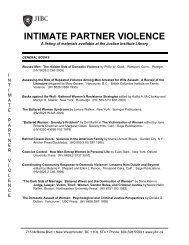legally speaking - Justice Institute of British Columbia
legally speaking - Justice Institute of British Columbia
legally speaking - Justice Institute of British Columbia
You also want an ePaper? Increase the reach of your titles
YUMPU automatically turns print PDFs into web optimized ePapers that Google loves.
light <strong>of</strong> all the circumstances, the 25-minute lapse<br />
from detention to arrest did not turn the lawful<br />
detention into one which was arbitrary or otherwise<br />
unlawful.<br />
Primarily for the reasons <strong>of</strong> the Crown, <strong>Justice</strong><br />
Prowse was not satisfied that the accused’s<br />
continued detention amounted to an arbitrary<br />
detention in the circumstances, nor did it give rise to<br />
a de facto arrest:<br />
In my view, the further relatively short period <strong>of</strong><br />
detention was necessary to ensure that the<br />
police were not placed in jeopardy should [the<br />
accused] alert any occupants <strong>of</strong> either his own<br />
or the other residences <strong>of</strong> the impending<br />
searches. It is also significant that his further<br />
detention was only until the police safely<br />
entered and secured the residence. At that point,<br />
given their discovery <strong>of</strong> an active grow<br />
operation, [the accused] was arrested. [para. 73]<br />
Despite the other Charter breaches found, the<br />
evidence was admitted, the accused’s appeal was<br />
dismissed, and his convictions upheld.<br />
Complete case available at www.courts.gov.bc.ca<br />
Side Bar<br />
Hydro Meter Checks<br />
The search warrant relating to theft <strong>of</strong><br />
hydroelectricity that the police relied upon in Trieu<br />
was largely based upon information obtained from<br />
meter tests conducted on and <strong>of</strong>f the property by a<br />
BC Hydro technician. The technician went onto the<br />
property at 10:15 pm to conduct a service check.<br />
He read the meter attached to the outside <strong>of</strong> the<br />
accused’s garage and then compared those readings<br />
with the electrical load on the underground service<br />
box located about 10 feet <strong>of</strong>f the property.<br />
The technician’s right to attend on private property<br />
to check Hydro equipment was found in the BC<br />
Hydro and Power Authority Electrical Tariff, enacted<br />
pursuant to regulatory powers found in s. 125 <strong>of</strong> the<br />
Utilities Commission Act, which stated:<br />
Volume 11 Issue 1 - January/February 2011<br />
PAGE 32<br />
The Authority’s agents and employees shall have at<br />
all reasonable times, free access to the equipment<br />
supplied with electricity and to the Authority’s<br />
meters and apparatus and the wires leading<br />
therefrom on the customer’s premises to ascertain<br />
the quantity or method <strong>of</strong> use <strong>of</strong> service.<br />
The technician had been responding to a report <strong>of</strong><br />
an overloaded transformer causing flickering lights in<br />
the neighbourhood, but DID NOT testify to that as<br />
the reason for conducting the service test. Had he<br />
done so, the <strong>British</strong> <strong>Columbia</strong> Court <strong>of</strong> Appeal<br />
would have had no problem accepting the<br />
technician’s entry onto the property at 10:15 pm as<br />
being at a reasonable time. An overloaded<br />
transformer or the threat <strong>of</strong> power failure would<br />
justify entry onto private property to address public<br />
concerns. But the evidence was that the service<br />
check was only ROUTINE. Hence, the Court <strong>of</strong><br />
Appeal found the technician’s attendance on the<br />
property in these circumstances at 10:15 pm was<br />
unreasonable.<br />
The fact that entry is restricted under the Tariff to<br />
reasonable times is a clear indication that not all<br />
times are considered reasonable, and that Hydro<br />
employees cannot attend on private property at will,<br />
regardless <strong>of</strong> the circumstances. In my view,<br />
reasonable residents <strong>of</strong> private property are likely to<br />
conclude that strangers entering onto their property<br />
at 10:15 at night without invitation are up to no good.<br />
The presence <strong>of</strong> an apparent intruder on their<br />
property might dispose them to call 911, or, in a<br />
worst-case scenario, take matters into their own<br />
hands. In other words, unannounced entry onto<br />
private property late at night could well result in<br />
breaches <strong>of</strong> the peace, or in emergency services being<br />
deployed and public expense incurred, without good<br />
reason. [para. 48]<br />
The explanation that Hydro did not have sufficient<br />
staff to attend to all Hydro business during daylight<br />
hours was not accepted. “I do not consider it to be a<br />
basis for finding that any hour <strong>of</strong> the night or day is a<br />
reasonable time for checking meters on private<br />
property,” said <strong>Justice</strong> Prowse. “Absent situations calling<br />
for immediate attention ... , mere convenience cannot<br />
justify attendance on private property late at night.”<br />
R. v. Trieu, 2010 BCCA 540






